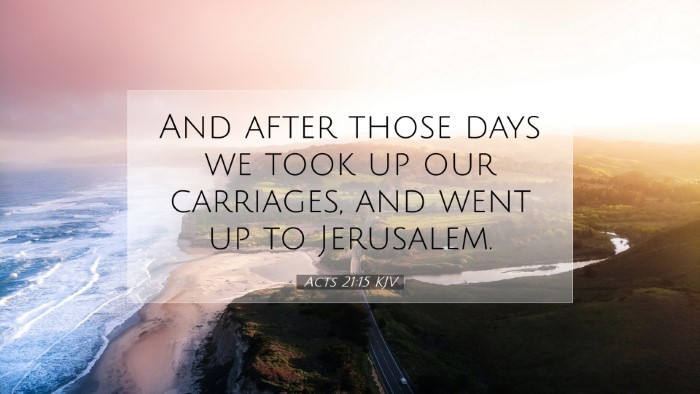Commentary on Acts 21:15
Introduction
Acts 21:15 reveals a pivotal moment in the apostle Paul's journey as he heads toward Jerusalem, symbolizing his commitment to the mission of spreading the Gospel despite the impending dangers. This verse encapsulates not only the physical journey but also the spiritual resolve required of those who follow Christ. Notably, it serves as a rich point of discussion for pastors, students, theologians, and scholars seeking to understand the depth of Paul's ministry and the implications of his actions.
Text of Acts 21:15
“And after those days we took up our carriages and went up to Jerusalem.”
Contextual Analysis
The immediate context in Acts reveals the close of Paul’s third missionary journey, where he is determined to return to Jerusalem despite warnings about the dangers awaiting him there. This determination is significant in understanding Paul’s character and mission.
- Historical Background: Paul had a tumultuous relationship with the city of Jerusalem, marked by both his past as a persecutor of Christians and his present role as a leading apostle.
- Geographical Significance: The phrase "we took up our carriages" indicates a preparation for travel, illustrating the physical effort involved in journeying to Jerusalem, which was also the spiritual heart of Israel.
Commentary Insights
1. The Resolve of Paul
Commentators like Matthew Henry highlight Paul's unyielding spirit and commitment to his mission. Paul knew the risks yet proceeded resolved to fulfill his apostolic duty. This highlights a key theme in Christian ministry: the readiness to face dangers for the sake of the Gospel.
2. The Role of Community
As noted by Albert Barnes, Paul's journey was not undertaken in isolation. The use of "we" indicates the support and fellowship of fellow believers. This signifies the importance of community in the Christian faith, as Christians are often called to face challenges together.
3. Prophetic Warnings
In the preceding chapters, Paul received explicit warnings about the suffering he would face in Jerusalem (Acts 21:4). Adam Clarke reflects on the significance of these prophetic messages, suggesting they serve not only as warnings but also as confirmation of the path Paul was to take. This duality shows that God’s guidance can sometimes lead into adversity.
Theological Implications
The passage raises poignant theological questions regarding the nature of Christian obedience. How does one balance prophetic warnings with the call to mission?
- Faith vs. Fear: Paul’s actions create a framework for discussing faith in the face of adversity. He exemplifies the belief that God’s plans often involve steps into uncertainty.
- Self-Sacrifice: Paul's willingness to endure hardships raises questions on the nature of discipleship and self-sacrifice for the sake of others’ faith.
Practical Applications
For contemporary pastors and leaders, Acts 21:15 serves as a mirror reflecting the challenges faced in ministry. It invites reflection on the commitment required to serve others, often at personal cost.
- Encouragement for Perseverance: Ministers are encouraged to be steadfast in their call, despite opposition or foreseen challenges.
- Building Community: The importance of community support in decision-making processes is emphasized, urging leaders to foster a culture of encouragement and shared mission among congregants.
- Listening to Warns: It encourages a posture of listening to the community, including evaluating the weight of prophetic warnings with prayerful discernment.
Conclusion
Acts 21:15 encapsulates a moment of profound significance in the life of Paul. It underscores themes of commitment, community, and courage in the face of adversity. The reflections from notable commentators offer valuable insights that can empower today's Christian community—encouraging a faithful response to God’s call, bolstered by the support of fellow believers, and grounded in the understanding of the challenges that may come. This verse, while situated in a specific historical moment, resonates across time and speaks to the perpetual journey of faith undertaken by all believers.


